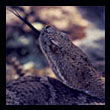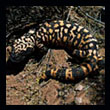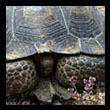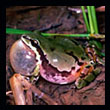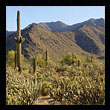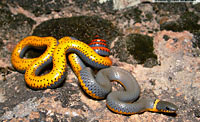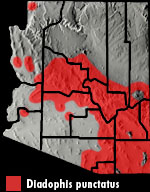Online Field Guide to The Reptiles and Amphibians of Arizona

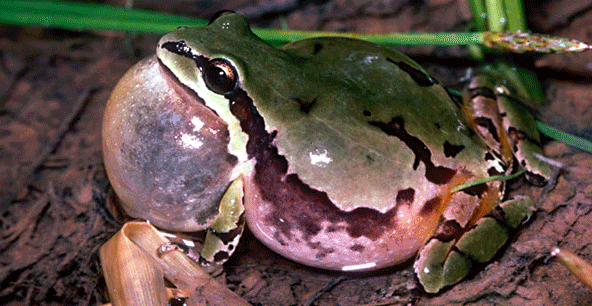
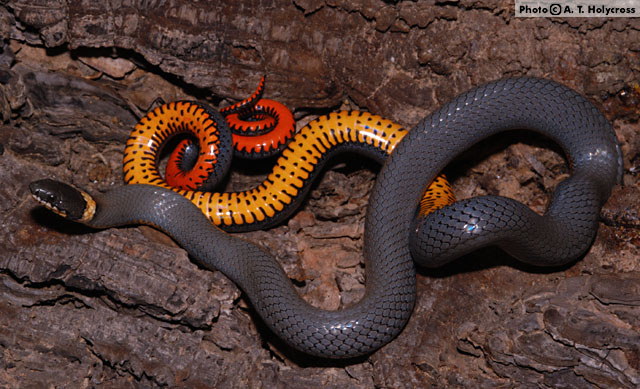
Santa Cruz County, AZ
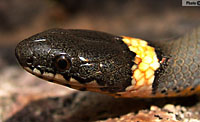 Santa Cruz Co., AZ |
| RING-NECKED SNAKE Diadophis punctatus |
Mildly Venomous
|
| DESCRIPTION: A small to medium (up to 857 mm or 34″ in total length), blue-gray to pale gray snake that usually has a cream, yellow, or orange ring on the neck. Some specimens, particularly in western and northwestern Arizona, lack the neck ring. The head is usually noticeably darker than the body on ringed individuals. The ventral surface grades from bright yellow-orange anteriorly to vibrant red below the tail. Numerous small black bars and spots mark the belly from head to tail. The scales are smooth and the body is uniformly slim and long relative to most other snakes. The pupils are round. The dark markings on its belly and its blue-gray coloration distinguish this snake from the similar looking Chihuahuan Black-headed Snake.
DISTRIBUTION: This snake is distributed across much of central Arizona and nearly all of southeastern Arizona. Populations (that might be isolated) in Mohave county include the Virgin Mts., lower Grand Canyon, Hualapai Mts. and Black Mts. Another potentially isolated population exists in the Kofa Mts. of Yuma County. In our state this snake has been found at elevations ranging from ca. 2,200′ in the low desert ranges of western Arizona to ca. 7,000′ above the Mogollon Rim. HABITAT: It is found in communities ranging from Mohave Desertscrub and Sonoran Desertscrub into Petran Montane Conifer Forest. This snake is encountered on grassy slopes, bajadas, foothills, canyon bottoms, and low valleys. In the more arid parts of the state it is usually found near drainages, springs, and riparian corridors. DIET: Mild venom delivered by enlarged rear teeth in the upper jaw is used to subdue prey which includes a variety of snakes, lizards, and insects. REPRODUCTION: Mating takes place in spring. A clutch of up to 18 eggs is laid in late spring or early summer. Bartlett. 2000. Snakes of North America: Western Brennan, T. C., and A. T. Holycross. 2006. A Field Guide to Amphibians and Reptiles in Arizona. Arizona Game and Fish Department. Phoenix, AZ Brennan, T. C., and A. T. Holycross. 2005. A Field Guide to Amphibians and Reptiles of Maricopa County. Arizona Game and Fish Department. Phoenix, AZ Degenhardt, W. G., Painter, C. W., and Price, A. H.. 1996. Amphibians and Reptiles of New Mexico. University of New Mexico Press. Albuquerque. Fowlie. 1965. The Snakes of Arizona. Azul Quinta Press, Fallbrook, California Lowe, Schwalbe, Johnson. 1986. The Venomous Reptiles of Arizona. Nongame Branch Stebbins. 1985. Western Reptiles and Amphibians. Houghton Mifflin. New York, NY |
|
Visit Partners in Amphibian and Reptile Conservation:


HOME
Copyright © 2023, Arizona Game and Fish Department. All rights reserved.
If you make use of the textual contents of this site in reports, publications, etc. please cite and credit the author(s) and photographer(s). All photos on this website are copyrighted. However, those found in the species account section may be used for any noncommercial scientific, educational, or conservation purposes provided that photographs are not altered and continue to bear the copyright symbol and name of the photographer. Please contact the photographer regarding commercial use of copyrighted photographs.
